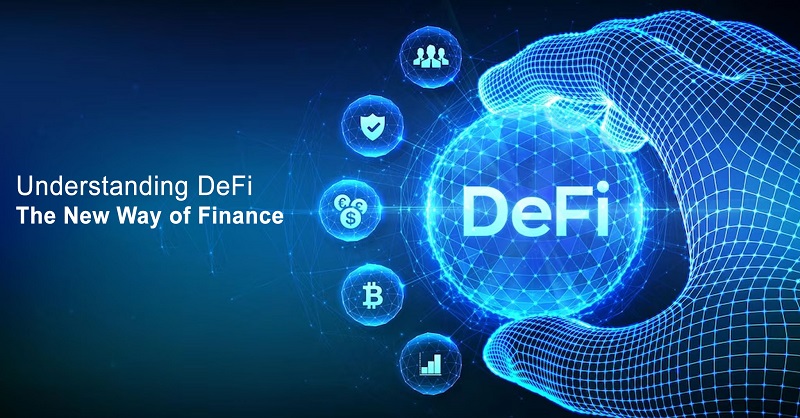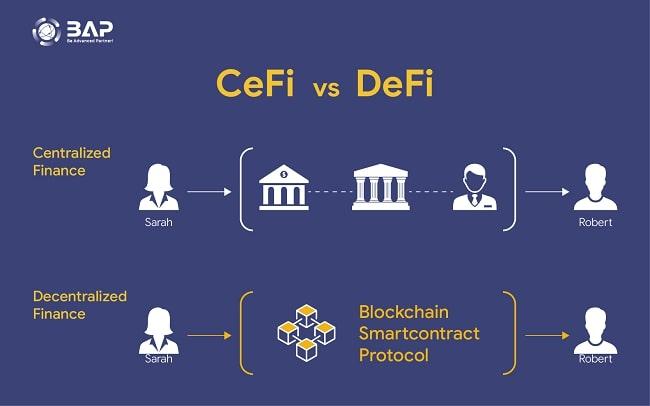In an era marked by rapid technological advancement, the financial landscape is undergoing a profound transformation. At the heart of this revolution lies Decentralized Finance, or DeFi—a burgeoning movement that promises to redefine the very foundations of banking as we know it. By harnessing the power of blockchain technology, DeFi seeks to dismantle traditional financial intermediaries, offering individuals unprecedented autonomy over their assets and transactions. Imagine a world where financial services are accessible to anyone with an internet connection, free from the constraints of geography and institutional bias. As we delve into the intricate workings and potential implications of this innovative paradigm, it becomes clear that the future of banking is not only being reimagined but also democratized—empowering users to take charge of their financial destinies like never before. Join us as we explore how Decentralized Finance is shaping the future of banking, one smart contract at a time.
Exploring the Fundamentals of Decentralized Finance and Its Impact on Traditional Banking
Decentralized Finance (DeFi) represents a radical shift in the way financial services are delivered, utilizing blockchain technology to provide alternative solutions that challenge conventional banking systems. By removing intermediaries, DeFi applications empower users with direct access to a range of financial services including lending, borrowing, and trading. This innovative approach presents significant benefits such as enhanced transparency, reduced costs, and the inclusion of underbanked populations—individuals who may have limited or no access to traditional banking services. The decentralized nature of these platforms also means that they are less prone to systemic risks associated with centralized institutions.
Furthermore, the impact of DeFi on traditional banking could be profound. Banks, often seen as gatekeepers of financial services, may face challenges in maintaining their market position as DeFi platforms gain popularity among users seeking more control over their assets. Key characteristics of DeFi products include:
- Smart Contracts: Automated and self-executing contracts eliminate the need for intermediaries.
- Global Accessibility: Anyone with an internet connection can participate, transcending geographical barriers.
- Programmability: Financial products can be customized easily to meet diverse needs.
| Aspect | Traditional Banking | Decentralized Finance |
|---|---|---|
| Intermediaries | Required | None |
| Accessibility | Restricted | Global |
| Fees | Typically High | Generally Low |
| Transparency | Limited | High |

Innovative Financial Products in Decentralized Finance That Are Reshaping Investment Strategies
In the ever-evolving landscape of decentralized finance, innovative financial products are emerging that challenge traditional investment norms. These products are designed to offer enhanced flexibility, risk management, and potential returns that were previously unattainable. Yield farming and liquidity mining, for instance, allow users to earn passive income by simply providing liquidity to a decentralized exchange. This model not only incentivizes participation but also promotes community engagement, as investors can earn rewards in the form of native tokens or a share in transaction fees. Moreover, new financial instruments such as synthetic assets enable users to gain exposure to real-world assets—from stocks to commodities—without ever owning the underlying assets, thus minimizing transaction costs and regulatory hurdles.
Another key development reshaping investment strategies is the introduction of decentralized autonomous organizations (DAOs), allowing investors to collectively make decisions regarding fund allocation and project support. DAOs create a community-driven approach to investment, enabling members to vote on proposals and receive dividends based on the success of their investments. Additionally, the rise of stablecoins offers a much-needed refuge from the volatility associated with many cryptocurrencies. By maintaining a pegged value, stablecoins provide a reliable means for transactions and hedging against market fluctuations, making them increasingly attractive for both individuals and institutional investors alike. As these innovative financial products gain traction, they foster a dynamic and inclusive investment landscape that empowers users to take control of their financial futures.

Navigating Risks and Challenges in Decentralized Finance: Safeguarding Your Investments
As the landscape of decentralized finance (DeFi) continues to evolve, it brings both exciting opportunities and inherent risks that every investor must navigate. Understanding these risks is crucial for anyone looking to participate in this transformative financial ecosystem. Key considerations include:
- Smart Contract Vulnerabilities: Flaws in code can lead to catastrophic financial losses.
- Market Volatility: The prices of digital assets can fluctuate wildly, impacting investment value.
- Lack of Regulation: In the absence of regulatory oversight, the potential for fraud and loss increases dramatically.
- Liquidity Risks: Insufficient liquidity can hinder your ability to execute trades when needed.
To safeguard your investments in this burgeoning space, embracing strategies that mitigate these risks is essential. Establishing a solid risk management framework can help preserve capital while seeking returns. Consider creating a diversified portfolio across different assets and protocols. Below is a simple breakdown of asset allocation strategies:
| Asset Type | Recommended Allocation |
|---|---|
| Stablecoins | 30% |
| Liquidity Pools | 40% |
| Yield Farming | 20% |
| High-Risk Tokens | 10% |
By being proactive and staying informed about the DeFi space, you can make educated decisions that align with your risk tolerance and investment goals.

Embracing the Future: Strategies for Integrating Decentralized Finance into Your Financial Portfolio
Integrating decentralized finance (DeFi) into your financial portfolio can seem daunting, but with the right strategies, it can lead to significant growth and diversification. Start by educating yourself on the various DeFi platforms and protocols. This knowledge can help you identify opportunities and assess risks effectively. Consider allocating a portion of your investments to stablecoins as a stepping stone into DeFi. These digital assets maintain their value relative to traditional currencies, providing a cushion against the volatility often associated with crypto assets. Explore yield farming, liquidity mining, and staking offerings; they can provide passive income and help your assets grow over time.
Another vital strategy is to cultivate a diversified portfolio within the DeFi space. By spreading your investments across different platforms and asset classes, you can mitigate risks while maximizing potential returns. Here are some strategies worth considering:
- Invest in various tokens: Diversify your holdings among established tokens and promising new projects.
- Utilize multiple DeFi protocols: Engage with various platforms for lending, borrowing, and trading to unlock potential rewards.
- Regularly review your portfolio: Stay informed about changes in the DeFi landscape to optimize your investments.
| Investment Type | Expected Returns | Risk Level |
|---|---|---|
| Stablecoins | Low to Medium | Low |
| Yield Farming | Medium to High | Medium |
| Liquidity Pools | Medium | High |
Closing Remarks
As we stand on the brink of a financial revolution, decentralized finance beckons us to reconsider our relationship with money, lending, and investment. It challenges the status quo, offering a transparent, accessible, and innovative approach that has the potential to democratize financial services for all. While the journey ahead may be uncertain and fraught with challenges, the underlying technology and principles of DeFi promise to empower individuals like never before.
In the coming years, as we witness the continued evolution of this transformative sector, it is crucial to remain informed and adaptable. The fusion of technology and finance may redefine the landscape of banking, pushing us toward a future where control and ownership are returned to the individual. As we navigate this new terrain, let us embrace the opportunities while remaining vigilant to the challenges, ensuring that the evolution of finance serves the greater good.
In this era of change, the questions we ask today will shape the answers of tomorrow. How will you engage with this revolution? The future of banking is unfolding, and it invites you to be part of the dialogue.



